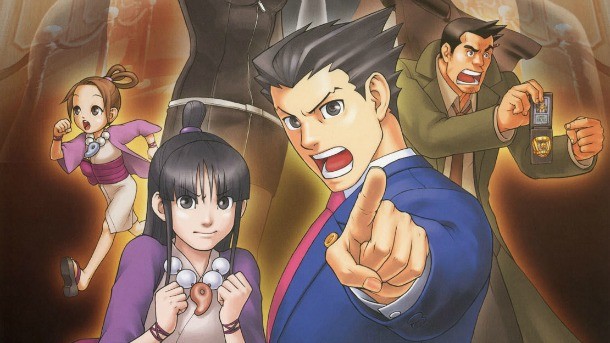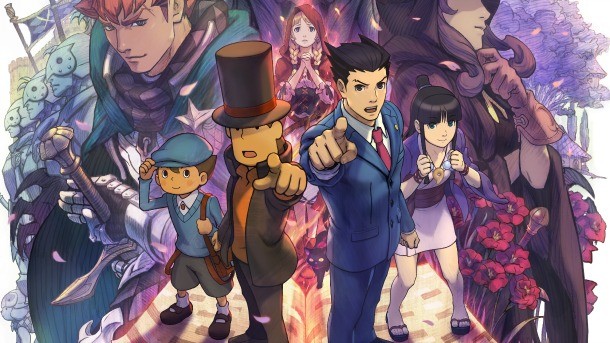Five Things You Probably Didn’t Know About Capcom’s Ace Attorney Series

Capcom's Ace Attorney has become a niche darling and is partially responsible for helping visual novel games catch on in the West. These games put you in the shoes of a defense attorney, finding clues and deducing information to put the right person behind bars. With fun gameplay, great humor, and eclectic characters, the series captivated fans and has spawned numerous entries along with a recent spin-off (Professor Layton vs. Phoenix Wright: Ace Attorney). Next month, the original trilogy also hits the Nintendo 3DS. We recently chatted with series creator Shu Takumi and found out some interesting tidbits about the eccentric franchise that we couldn't help but share.
The TV Show Columbo Was A Big Influence

That's right. The iconic detective TV show has been a huge source of inspiration for Ace Attorney. It makes sense, doesn't it? After all, the show is about exposing the criminal by finding the right evidence. "I've been a big fan of the show since I was in elementary school, and there's even a scene or two in the games that were inspired by it," Takumi says. Takumi also notes that the series is extremely popular in Japan, becoming somewhat of a phenomenon for the mystery genre. "Thanks to this, I often find myself saying, 'That's straight out of Columbo!' when I watch Japanese dramas on TV," Takumi says. "I guess it shows how much of a classic Columbo has become, doesn't it?" Now other characters' constant underestimation of the Ace Attorney protagonists is starting to make sense.
Resident Evil And Mikami Had A Huge Impact On Shaping The Game
Another famed Capcom franchise had a big impact on the series: Resident Evil. Takumi worked with creator Shinji Mikami on Dino Crisis, and took some of his words of wisdom to heart. Resident Evil might seem a far cry from the lighthearted Ace Attorney, but Takumi says Resident Evil is the game he references the most when thinking about the "game" aspect of Ace Attorney. "Using Resident Evil as an example, Mr. Mikami taught us how to construct a game, such as how to fuse the element of fear with action, and the purpose behind key items," Takumi says. "His way of thinking really left an impression on me, and so, when I think about Ace Attorney, I still reference those lectures he gave on how to construct a game."
Takumi also recalls the philosophical discussions that Mikami liked to propose and these conversations have stayed with him. "Mr. Mikami really loved to wax philosophical about things like 'What does it mean to make a game?,' 'What is a director?,' and 'What is the meaning of life?,' but because he kept on talking about these topics with us over and over again, those of us working under him wound up with a better understanding of game creation and his household affairs than even him," Takumi says. "Those talks have remained with me to this day and have had a lasting impact on my work. Even now, his words influence how I think about games. Although, looking back on it now, more than wanting to impart knowledge to us, it seems like he just wanted to talk."
Takumi Had Doubts About Professor Layton vs. Phoenix Wright: Ace Attorney

Crossover games aren't the easiest ventures, but Professor Layton and Phoenix Wright seems like a combination too good to pass up, especially considering their similar focuses. However, Takumi wasn't completely convinced about the project's potential success. When it was first pitched, Takumi was busy at work on Ghost Trick: Phantom Detective, and wasn't planning on being on the project. "I personally disliked the thought of using the Ace Attorney universe to do a simple crossover with another franchise," Takumi recalls. "But Mr. Hino (Level 5's president), who has always been a fan of Ace Attorney, had wanted to do more than just borrow the series' title and some characters; his goal had been to have me on the project, and hearing that put me at ease and I gladly agreed to his proposal. I suggested the idea of having witch trials, and became the writer and director of the Ace Attorney parts of the game."
Despite his initial reservations, Takumi was happy with his work on the game and glad he did the project. "With this game, I was able to bring to life something I wouldn't have been able to in the actual Ace Attorney series: trials that take place in a world where magic exists."
Edgeworth's Infamous Cravat Was Almost Axed

The Ace Attorney characters have their own unique styles. From Phoenix's famous blue suit to Maya's spirit medium garb, these designs are an essential part of each character. "Whether it's Mickey Mouse or Pikachu, the best characters out there have their own unique silhouette," Takumi says. "There's just something about them that catches the eye and makes them incredibly memorable and iconic. We put a lot of thought into the overall outline and shape of all of our characters when we designed them."
Miles Edgeworth exudes confidence and prestige as a top prosecutor, obsessed with winning. His cravat stands out as one of his defining features, but the team originally had doubts about it. "There was some opposition to Edgeworth's cravat initially, with some people saying, 'No prosecutor would ever be caught wearing that!' But once his mentor Manfred von Karma's design was finalized, everyone took Edgeworth's cravat in stride," Takumi says.
It Didn't Originally Embrace Its Japanese Flavor

Now playing an Ace Attorney game, it's clear that it's set in Japan, but Takumi didn't originally include anything overtly Japanese in the first game on purpose. The series got its start on the Gameboy Advance, but it wasn't brought over to the West until it was ported to the Nintendo DS. Therefore, when working on the first game, Takumi kept in mind that it could possibly be localized and avoided Japanese references. "But, then I found out that Capcom was not planning to make an overseas version of the game, so from the second game onwards, I used some language-based tricks and some clearly Japanese settings such as Maya's hometown, Kurain Village," he says. After Takumi made the third entry, Capcom let him know the series would localized after all. "I still wonder exactly how all those elements were translated. I guess another major difference between the Japanese and English versions would be the pop culture references." Funny enough, the pop culture references have become popular with North American fans, and we can thank Capcom's localization team for that.
Want more Ace Attorney goodness? We have more features on the way from our chat with Shu Takumi, so stay tuned for more insight into the franchise. In the meantime, check out our pieces on the funniest characters and why Pearl should have her own spin-off.

Get the Game Informer Print Edition!
Explore your favorite games in premium print format, delivered to your door.
- 10 issues per year
- Only $4.80 per issue
- Full digital magazine archive access
- Since 1991









